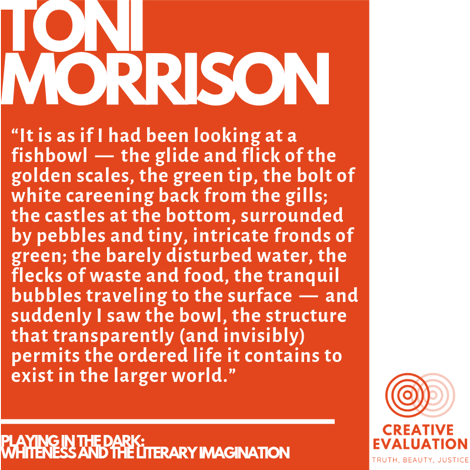
I’m A. Rafael Johnson, an arts-based evaluator at TerraLuna Collaborative in Minneapolis. I use the methodologies of the arts to gather, analyze, and report data for communities, arts organizations, and non-arts organizations. But I’m a writer and novelist before I’m an evaluator. Words matter to me.
For me, words carry meaning. In fact, words are a type of social contract. Words mean what societies agree they mean, such as benchmark, formative, and reliability. Each word carries a socially agreed-upon meaning that communicates values, emotions, taboos, and power relationships. Some words, such as indicator, meta-evaluation, and qualitative, withhold knowledge from some while transmitting to others.
So instead of retiring a word, I want to encourage evaluators to use a particular word to communicate values, social norms, and power, and to use that word more often, with more precision, and to transmit knowledge to a wider audience. That word is whiteness.
 Whiteness is a socially constructed identity and ideology. Whiteness was constructed in the 1800’s to enable and justify transatlantic slavery and colonization of indigenous lands and peoples. Whiteness includes concepts of labor, gender, class, beauty, culture, ethics, religion, and intelligence, but also white privilege and white supremacy. America formed during the creation of whiteness, and whiteness dominates most if not all of our social and economic structures, from economics to education to law enforcement to health care. Yet whiteness often goes invisible and unnamed. Peggy McIntosh argued: “To redesign social systems we need first to acknowledge their colossal unseen dimensions. The silences and denials surrounding [white] privilege are the key political tool here. They keep the thinking about equality or equity incomplete, protecting unearned advantage and conferred dominance by making these taboo subjects.”
Whiteness is a socially constructed identity and ideology. Whiteness was constructed in the 1800’s to enable and justify transatlantic slavery and colonization of indigenous lands and peoples. Whiteness includes concepts of labor, gender, class, beauty, culture, ethics, religion, and intelligence, but also white privilege and white supremacy. America formed during the creation of whiteness, and whiteness dominates most if not all of our social and economic structures, from economics to education to law enforcement to health care. Yet whiteness often goes invisible and unnamed. Peggy McIntosh argued: “To redesign social systems we need first to acknowledge their colossal unseen dimensions. The silences and denials surrounding [white] privilege are the key political tool here. They keep the thinking about equality or equity incomplete, protecting unearned advantage and conferred dominance by making these taboo subjects.”
I’m not asking white evaluators to change whiteness – I’m asking white evaluators to name whiteness. I’m asking white evaluators to critically examine concepts based in whiteness, including (but not limited to) baselines, control groups, evaluation rigor, implementation fidelity, achievement gap, outcome disparities, and other gatekeeping jargon that communicates whiteness to some while obscuring whiteness to others. I’m asking white evaluators to name whiteness so evaluation no longer enforces whiteness as an invisible mechanism of control and domination. (Even the AEA365 guidelines silently encourage me to write ‘evaluator’ instead of ‘white evaluator’ to keep the word count down.)
As a bonus, I’d like white evaluators to name whiteness without placing white guilt or white fragility on an evaluator of color. But I have to admit, I don’t hold out much hope.
Rad Resources:
- hooks, bell. (1992). “Representations of Whiteness in the Black Imagination.” In Black Looks: Race and Representation. Boston: South End Press.
- Engles, Tim. (2006). “Toward a Bibliography of Critical Whiteness Studies.” Faculty Research & Creative Activity. 51. Eastern Illinois University.
- McIntosh, Peggy. (2016). “White Privilege: Unpacking the Invisible Knapsack.” In Rothenberg, Paula S. ed. Race, Class, and Gender in the United States: An Integrated Study (10th ed.). New York: Worth Publishers/Macmillan Learning. pp. 188–192
- Morrison, Toni. (1993). Playing in the Dark: Whiteness and the Literary Imagination. New York: Vintage Books.
The American Evaluation Association is celebrating A Look at Language Week where a group of Minnesota-based evaluators working in justice and equity spaces contribute articles reflecting on the words we use. Do you have questions, concerns, kudos, or content to extend this aea365 contribution? Please add them in the comments section for this post on the aea365 webpage so that we may enrich our community of practice. Would you like to submit an aea365 Tip? Please send a note of interest to aea365@eval.org. aea365 is sponsored by the American Evaluation Association and provides a Tip-a-Day by and for evaluators.

“I’m asking white evaluators to critically examine concepts based in whiteness, including (but not limited to) baselines, control groups, evaluation rigor, implementation fidelity, achievement gap, outcome disparities, and other gatekeeping jargon that communicates whiteness to some while obscuring whiteness to others.”
I don’t want to be limited to a white-centric viewpoint, but I struggle with what to replace it with. What alternate approaches and language would be more universal?
Thanks for this post – very interesting and challenging, personally and professionally. I was challenged by your final statement, “But I have to admit, I don’t hold out much hope.”
I’m a white evaluator working to learn more about how racial and social assumptions and biases play into my work and the work of those around me. I certainly plan to read up on the Rad Resources you have provided, but I’m wondering: are there examples of evaluative work that you could point to that do this – naming whiteness and critically examining the related concepts – better than others?
A. Rafael, thank you so much for this piece. These are things that I, as a white woman, am trying to incorporate into my evaluation practice. I find that I get push-back when I suggest naming whiteness, or recommend that we acknowledge systematic marginalization that makes “baselines” and “outcomes” and “sustainability” disproportionate among groups within a study population. Despite the push-back, I will continue to name whiteness, and acknowledge its historic and current influence on evaluation and the things we evaluate. Thanks again for writing these words and sharing your expertise.